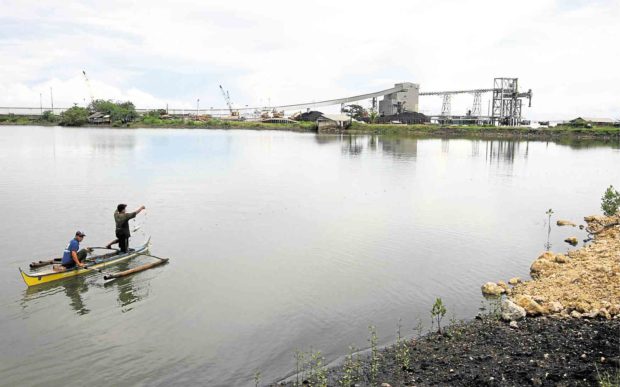
UNDER WATER Sections of the property bought by the Cebu provincial government for a housing project turned out to be under water. —TONEE DESPOJO/CEBU DAILY NEWS
CEBU CITY — The Office of the Ombudsman has upheld the dismissal from service of Deputy Speaker Gwendolyn Garcia over the unauthorized P24.47-million project to backfill a largely underwater property that was bought when she was governor of Cebu province.
In an order dated July 18, graft investigation and prosecution officer, Kristine Suzanne Fineza, found no sufficient basis to reverse the Ombudsman’s earlier ruling.
“The motion for reconsideration lacks merit,” said Fineza, whose findings were approved by then Ombudsman Conchita Carpio Morales, who retired last month.
Political persecution
But Garcia, who represents the third congressional district of Cebu, said the decision was nothing but “political persecution.” She said she would contest the ruling in the Court of Appeals (CA).
“What do you expect from a retired Ombudsman who has done nothing else but to persecute us?” Garcia told reporters on Monday.
According to her, Morales is a friend of former Chief Justice Hilario Davide Jr., the father of her political opponent, Gov. Hilario Davide III.
“It’s very clear that she (Morales) is after me because I’ll be running against the incumbent governor, who is her friend…,” she said.
Sowing confusion
She said Morales was “incapable of rendering a fair and just decision against me,” because of her “personal closeness” to Davide Jr.
“Her denial of my motion for reconsideration in this case, therefore, which was filed by her friend’s son, comes as no surprise,” Garcia said.
“The intention to sow confusion among the public is evident in how the denial is now being twisted and presented as an alleged bar against my running for governor next year. This is patently misleading,” she said.
Garcia said the Ombudsman decision, while “executory for certain officials, was not final.” It is appealable to the CA, she said, adding that the “only bar under the election laws is conviction by final judgment of a crime involving moral turpitude or an offense with a penalty of more than one year.”
Jurisdiction
Garcia, in her motion for reconsideration, said she could not be made accountable for an administrative offense committed during her previous term, citing the Aguinaldo doctrine, or the condonation doctrine, which considers an elective official cleared of past misdeeds if he or she was elected again.
FISH RELEASE In this file photo, then Cebu Gov. Gwendolyn Garcia releases tilapia fingerlings at a pond in the provincial government-owned property in Naga City.
Also, she said the Ombudsman had no administrative disciplinary authority over members of Congress.
But the antigraft office disagreed with Garcia.
Fineza, in her order, said the condonation doctrine only applied to a “public officer who is elected to a different position provided that it is shown that the body politic (voters) electing the person to another office is the same.”
“This office, however, finds that the body politic that elected her as representative is not the same as those who voted her previously as Cebu governor,” she said.
As to Garcia’s argument that the Ombudsman had no jurisdiction over her, Fineza said the lawmaker was still Cebu governor when the complaint against her was filed on June 6, 2013.